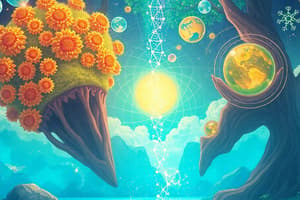Podcast
Questions and Answers
Which characteristic of science ensures that experiments can be repeated by other researchers?
Which characteristic of science ensures that experiments can be repeated by other researchers?
- Falsifiable
- Empirical
- Hypothetical
- Replicable (correct)
Which branch of science primarily studies human behavior and societal dynamics?
Which branch of science primarily studies human behavior and societal dynamics?
- Applied Sciences
- Formal Sciences
- Social Sciences (correct)
- Natural Sciences
What is the first step in the scientific method?
What is the first step in the scientific method?
- Hypothesis
- Question
- Observation (correct)
- Reporting
Which of the following best describes the term 'falsifiable' in science?
Which of the following best describes the term 'falsifiable' in science?
Which scientific discipline specifically focuses on the study of matter and energy?
Which scientific discipline specifically focuses on the study of matter and energy?
What is the primary purpose of applied sciences?
What is the primary purpose of applied sciences?
What is the role of analysis in the scientific method?
What is the role of analysis in the scientific method?
Which major branch of science includes biology, chemistry, and physics?
Which major branch of science includes biology, chemistry, and physics?
Flashcards are hidden until you start studying
Study Notes
Definition of Science
- Systematic enterprise that builds and organizes knowledge in the form of testable explanations and predictions about the universe.
Key Characteristics
- Empirical: Based on observation and experimentation.
- Hypothetical: Involves forming hypotheses that can be tested.
- Replicable: Experiments and results must be repeatable by others.
- Falsifiable: Must be able to be disproven by evidence.
Major Branches of Science
-
Natural Sciences
- Study of natural phenomena.
- Includes:
- Physics: Study of matter, energy, and the fundamental forces.
- Chemistry: Study of substances, their properties, and reactions.
- Biology: Study of living organisms and their interactions.
-
Social Sciences
- Study of human behavior and societies.
- Includes:
- Psychology: Study of the mind and behavior.
- Sociology: Study of social behavior and society.
- Economics: Study of the production, distribution, and consumption of goods and services.
-
Formal Sciences
- Study of abstract concepts and systems.
- Includes:
- Mathematics: Study of numbers, quantities, and shapes.
- Logic: Study of reasoning and argumentation.
-
Applied Sciences
- Utilization of scientific knowledge for practical purposes.
- Includes:
- Engineering: Application of scientific principles to design and build structures, machines, and processes.
- Medicine: Application of biological and chemical knowledge to diagnose and treat illnesses.
Scientific Method
- Observation: Gathering data through the senses.
- Question: Formulating a question based on observations.
- Hypothesis: Proposing a testable explanation.
- Experimentation: Conducting tests to gather data supporting or refuting the hypothesis.
- Analysis: Interpreting data to draw conclusions.
- Reporting: Sharing results with the scientific community.
Importance of Science
- Drives technological advancements.
- Enhances understanding of the natural world.
- Informs public policy and ethical considerations.
- Addresses global challenges (e.g., climate change, health crises).
Notable Scientific Theories
- Theory of Evolution: Explains the diversity of life through natural selection.
- Theory of Relativity: Revolutionizes understanding of space, time, and gravity.
- Germ Theory: Establishes that many diseases are caused by microorganisms.
Recent Trends and Developments
- Interdisciplinary research combining multiple fields.
- Advancements in technology (e.g., AI, biotechnology).
- Increased focus on sustainability and environmental science.
- Citizen science initiatives engaging the public in research.
Definition of Science
- Systematic approach for organizing and building knowledge about the universe through testable explanations and predictions.
Key Characteristics
- Empirical: Relies on observation and experimentation to gather data.
- Hypothetical: Involves the formulation of hypotheses that are testable through experiments.
- Replicable: Results and experiments must be repeatable by different researchers for validation.
- Falsifiable: Scientific claims must be able to be disproven with evidence.
Major Branches of Science
- Natural Sciences: Investigates natural phenomena, encompassing disciplines like:
- Physics: Studies matter, energy, and fundamental forces.
- Chemistry: Analyzes substances, their properties, and chemical reactions.
- Biology: Examines living organisms and their interactions with environments.
- Social Sciences: Examines human behavior and societal structures, including:
- Psychology: Focuses on the mind and behavior.
- Sociology: Studies social behavior and institutions.
- Economics: Analyses production, distribution, and consumption of goods and services.
- Formal Sciences: Deals with abstract concepts and reasoning processes, including:
- Mathematics: Studies numbers, quantities, and geometrical shapes.
- Logic: Investigates principles of reasoning and argumentation.
- Applied Sciences: Utilizes scientific knowledge for practical applications, including:
- Engineering: Applies scientific methods to design and construct systems and structures.
- Medicine: Uses biological and chemical principles for diagnosing and treating health issues.
Scientific Method
- Observation: Collecting data through sensory experience.
- Question: Developing inquiries based on gathered observations.
- Hypothesis: Formulating a potential testable explanation for the question posed.
- Experimentation: Conducting tests to obtain data that supports or challenges the hypothesis.
- Analysis: Evaluating data to derive conclusions.
- Reporting: Sharing findings with the scientific community for scrutiny and further research.
Importance of Science
- Fuels technological progress and innovation.
- Enhances understanding of natural mechanisms and processes.
- Informs public policy and ethical frameworks.
- Addresses complex global issues such as climate change and health emergencies.
Notable Scientific Theories
- Theory of Evolution: Provides a framework for understanding the diversity of life through natural selection.
- Theory of Relativity: Transformational theory impacting concepts of space, time, and gravity.
- Germ Theory: Identifies microorganisms as the causes of many diseases, revolutionizing medicine.
Recent Trends and Developments
- Promotion of interdisciplinary research that blends various scientific fields.
- Significant advancements in technology, including artificial intelligence and biotechnology.
- Greater emphasis on sustainability and environmental sciences within research.
- Rise of citizen science initiatives, empowering public participation in scientific research.
Studying That Suits You
Use AI to generate personalized quizzes and flashcards to suit your learning preferences.




